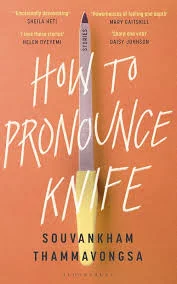
Fellow neighbour, bibliophile and retired academic Neil Béchervaise is back for another guest post. We've been in Stage 4 lockdown in Melbourne for 5 weeks now and reading up a storm. Here's Neil's review of short story collection How to Pronounce Knife by Souvankham Thammavongsa. Over to you Neil!
Let me confess from the outset that ‘the short story’ is not my favourite ouvre. However, I was seduced by the title of this book and launched into it before I realised that it was, indeed, a collection.
Who has not pondered the vagaries of ‘The English language’? When ‘ph’ becomes ‘f’ in physical but ‘ps’ becomes a mere ‘s’ if we get psychological; when ‘is’ is pronounced ‘eye’ in island! Well, I had to discover how to pronounce ‘knife’, at least.
This fascinating, frequently gruelling and sometimes just downright heart-rending selection of episodes comes to its readers through the eyes of a Laotian refugee. From her early childhood towards old age; from seeing her father disappear under the surface of the river they are crossing in pursuit of ‘freedom’ to experimenting with the difference between love and sex at age 70, the stories are always engaging. Many of them are also deeply challenging to what most of us, probably, would see as ‘the norm’.
The unconscious racism of the children at school when the author struggles to find out how to pronounce ‘knife’ is both topical and humbling. Her humiliation when no-one at home could speak English despite her father doing his best to help - but only making matters worse - and her not yet confident enough to ask any classmates brought tears to my eyes. Some years later, doubting her own personal beauty, as so many teenagers girls do, she seriously contemplates having ‘a nose job’. Fortunately, her workmates, and her lack of money, dissuade her from proceeding as they see more and more failed surgeries creating terrible results.
The stories in this collection are sometimes uplifting, sometimes heart-breaking. The resilience of the refugees, essentially unsupported and battling to come to terms with cultural, language and even dietary differences in their new homeland make for compelling reading.



































